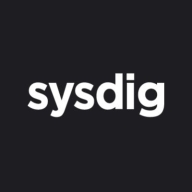


Sysdig Secure and Zscaler Zero Trust Exchange compete in cybersecurity. Sysdig leads in pricing and customer support, while Zscaler provides superior security features that justify its higher price.
Features: Sysdig Secure offers container and Kubernetes security with runtime threat detection, compliance, and image scanning capabilities. It also integrates well with cloud providers like AWS, Azure, and Google Cloud, offering in-depth visibility. Zscaler Zero Trust Exchange focuses on secure access service edge (SASE) solutions, providing robust cloud security, zero-trust network access, and comprehensive internet access protection. Its API integration and DLP capabilities enhance security management.
Room for Improvement: Sysdig Secure could enhance scalability, streamline UI complexity, and improve the integration process with third-party solutions. Zscaler might benefit from reducing deployment complexity, addressing latency issues in some regions, and refining its threat detection algorithms for better efficiency.
Ease of Deployment and Customer Service: Sysdig Secure is easier to deploy for container environments with supportive customer service. Zscaler's deployment can be complex due to its range of features, yet its strong support teams assist in overcoming these challenges.
Pricing and ROI: Sysdig Secure offers competitive pricing with good ROI for container security, while Zscaler's solution involves higher costs justified by its extensive security features. Zscaler delivers significant ROI for organizations requiring comprehensive security solutions.
| Product | Market Share (%) |
|---|---|
| Sysdig Secure | 3.3% |
| Wiz | 17.4% |
| Prisma Cloud by Palo Alto Networks | 12.4% |
| Other | 66.9% |
| Product | Market Share (%) |
|---|---|
| Zscaler Zero Trust Exchange Platform | 9.5% |
| Prisma Access by Palo Alto Networks | 11.8% |
| Cato SASE Cloud Platform | 9.8% |
| Other | 68.9% |

| Company Size | Count |
|---|---|
| Small Business | 48 |
| Midsize Enterprise | 23 |
| Large Enterprise | 54 |
| Company Size | Count |
|---|---|
| Small Business | 6 |
| Midsize Enterprise | 2 |
| Large Enterprise | 5 |
| Company Size | Count |
|---|---|
| Small Business | 16 |
| Midsize Enterprise | 12 |
| Large Enterprise | 42 |
SentinelOne Singularity Cloud Security offers a streamlined approach to cloud security with intuitive operation and strong integration capabilities for heightened threat detection and remediation efficiency.
Singularity Cloud Security stands out for its real-time detection and response, effectively minimizing detection and remediation timelines. Its automated remediation integrates smoothly with third-party tools enhancing operational efficiency. The comprehensive console ensures visibility and support for forensic investigations. Seamless platform integration and robust support for innovation are notable advantages. Areas for development include improved search functionality, affordability, better firewall capabilities for remote users, stable agents, comprehensive reporting, and efficient third-party integrations. Clarity in the interface, responsive support, and real-time alerting need enhancement, with a call for more automation and customization. Better scalability and cost-effective integration without compromising capabilities are desired.
What are SentinelOne Singularity Cloud Security's standout features?SentinelOne Singularity Cloud Security is deployed in industries needing robust cloud security posture management, endpoint protection, and threat hunting. Utilized frequently across AWS and Azure, it assists in monitoring, threat detection, and maintaining compliance in diverse environments while providing real-time alerts and recommendations for proactive threat management.
In the cloud, every second counts. Attacks move at warp speed, and security teams must protect the business without slowing it down. Sysdig stops cloud attacks in real time, instantly detecting changes in risk with runtime insights, a unique AI architecture, and open source Falco. Sysdig delivers live visibility by correlating signals across cloud workloads, identities, and services to uncover hidden attack paths. By knowing what is running, teams can prioritize the vulnerabilities, misconfigurations, permissions, and threats that matter most. From prevention to defense, Sysdig helps enterprises move faster and focus on what matters: innovation.
Sysdig. Secure Every Second.
Zscaler Zero Trust Exchange enhances security with seamless cloud-based connectivity and VPN-less operation, offering integration with multiple identity providers and advanced security features, suitable for remote work environments.
Zscaler Zero Trust Exchange provides secure, adaptive connectivity without traditional VPNs, allowing organizations to replace legacy systems and bolster remote work security. The platform offers cloud-based protection, single sign-on, dynamic URL categorization, and scalable solutions. While advanced security features like DLP and threat protection enhance data protection, users may face issues with speed, connectivity, and some customization options. Integration challenges, latency due to multi-tenant hosting, reporting delays, and licensing costs require consideration. It supports secure internet access and private application security, ensuring traffic control and data compliance.
What are the key features of Zscaler Zero Trust Exchange?
What are the benefits of using Zscaler Zero Trust Exchange?
Zscaler Zero Trust Exchange is deployed across industries to secure remote access and enforce zero trust principles. Organizations in finance, healthcare, and technology sectors utilize it for secure internet access and visibility into cloud applications, enhancing performance and compliance in dynamic environments.
We monitor all Cloud-Native Application Protection Platforms (CNAPP) reviews to prevent fraudulent reviews and keep review quality high. We do not post reviews by company employees or direct competitors. We validate each review for authenticity via cross-reference with LinkedIn, and personal follow-up with the reviewer when necessary.